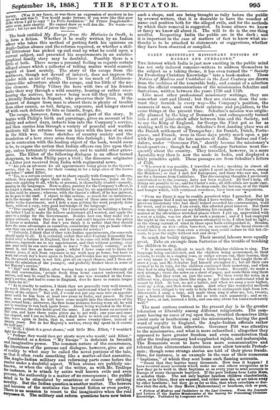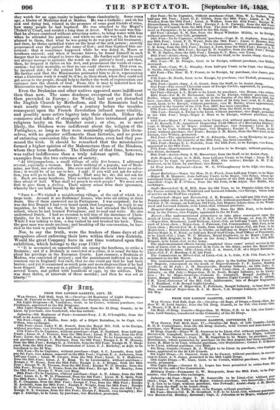EARLY PROTESTANT MISSIONARY NOTICES OF
MADRAS AND CIIDDALORE.* THE interest which India is just now exciting in the public mind has not only induced romance-writers to address themselves to the subject as a taking theme, it has even turned the " Society for Promoting Christian Knowledge" into a book-maker. These Notices of Madras and Cuddalore in the Last Century are drawn from the archives of the venerable body, and consist of a selection from the official communications of the missionaries Schultze and Sartorious, written between the years 1726 and 1738.
Like most other professional missionary writings, they are somewhat curt and literal ; but they are curious from the con- trast they furnish in every way—the Company's position, the manners of men, and even their opinions and prejudices, to the same things at the present time. Schultze's mission was origin- ally planned by the king of Denmark ; and subsequently turned into a sort of joint-stock affair between him and the Society, not to say the King of England, for George the First got as far as wishing well to the design. Schultze's first.landing place was at the Danish settlement of Tranquebar ; for Danish, Dutch, Portu- guese, and French, were in those days pretty much upon a par with the position of the late masters of India. Madras and Cud- dalore, under "Governor Pitt," shortly became the missionary's head-quarters ; though lie and his colleague Sartorius went fre- quently about the country. They travelled, however, in a more Apostolic way than is now the mode in India, and displayed a truly primitive spirit. These passages are from Schultze's letters of 1726.
"Wherever it was possible, I travelled on foot ; speaking in almost all the villages I passed through. My nights I spent in the rest-houses, among the Malabars ; so that I met few Europeans, and those who saw me,. took me for a freeman from Cuddalore. The discouraging thoughts I previously entertained as to the journey, have not been realized. By God's help, all things are possible to us ; and for Christ's sake, all difficulties are made easy. I will not complain, therefore, of the deep sands, the hot sun, or of the thirst and hunger which, with continual weariness, have been our companions.
" From my Diary it may be readily perceived what I preached. But let no one suppose that I said no more than I have written. Mr. Ziegenbalg [a previous missionary who had died] indeed recorded his conversations, word for word, and to many, I am aware, this afforded great interest. But there were many things to prevent my following his example. For the time I re- mained at the oftentimes wretched places where I put up, unprovided with a seat or a table, was too short for such a purpose ; and if I had employed the night in the work, as I sometimes attempted to do, I often had no light ; or the strong current of wind in these open halls extinguished it. Besides, after walking on foot—often bare-foot, on account of the broad rivers—it would have been more than even a strong man could endure in this hot cli- mate, to pass the night without rest and sleep."
So much for bodily fatigue. Their mental labours were equally great. Take an example from Sartorius of the trouble of teaching the children to sing.
" It is extremely difficult to teach the Malabar children to sing. The language being uncultivated, and the children being accustomed, in their schools, to recite in a singing tone, or rather scream out, their lessons, they are very unapt to learn to sing. Our fellow-helpers had taught them al- most a year, and Mr. Schultze had himself attempted it ; but O. their care seemed to be in vain, for the children continued their monotony, and when they had to sing high, only screamed a little louder. Recently, we made a new attempt ; wrote the notes on a sheet of paper, and made them sing them with us. But they went on just the same. We then wrote the notes in a different way, disposing them like steps, to get them to understand what is meant by high. At last, we got a ladder, and when we sung a note higher, went up a step, and then down again. And other like wonderful methods have we been obliged to try only to help them to distinguish high from low. Afterwards I sung a tune, and made them sing it after me, ten, twenty, nay a hundred times. Then, I did so with each separately; and so on. Thev have, at last, learned a little, and can sing about ten tunes moderately well " The most curious contrast to the present day is in the greater toleration or liberality among different religionists. The com- pany having no cares of raj upon them, troubled themselves little about caste or heathenism ; and the missionaries, having the good word of royalty in England, the Anglo-Indian officials rather encouraged them than otherwise. Governor Pitt was attentive to the missionaries, and what is more subscribed ; altogether they appeared to have greater freedom and even consideration than after the trading company had supplanted rajahs, and maharajahs. The Romanists seem to have been more communicative and tolerant than ultramontane doctrines now allow towards Protest- ants ; though some strange stories are told, of their pious frauds. Here, for instance, is an example in the case of their numerous " baptisms " of which they sent home such flaming accounts. "Grant that they baptize many thousands. How does it happen ? I have received many accounts which make me and others scrupulous as to how they go to work in their ba.ptisms so as every year to send accounts to Europe of many thousands baptized. If the poor Indians hear Latin Maw, it satisfies them. The not only baptize heathen children clandestinely, when, as in China, they are exposed, and either soon die, or are taken away by other heathens ; but they go as far as this, that when catechists or doc- tors visit the sick, be they Moors [Mahometans] or heathens, rich or poor,
• Notices of Madras and Chuldalore in the Last Century. From the Journals and Letters of the Earlier Missionaries of the Society for Promoting; Christian Knowledge. Published by Longmans and Co.
they watch for an opportunity to baptize them clandestinely. Some years ago, a Doctor of Medicine died at Madras. He was a Catholic ; and on his sick and dying bed, related in the presence of some good friends of mine, how many people he had baptized. He was attached to the Mogul's [Nabob's] Court, and resided a long time at Arcot. What he said was this : that he always contrived without attracting notice, to bring water with him when be attended his patients ; and when no one else was by, he first ex- plained to them, that what he was going to do was part of his treatment ; and then, he thrice sprinkled water on the head of the sick person ; secretly pronounced over the patient the name of God ; and thus baptized him un- noticed : that it sometimes happened while he was doing it, Moors or heathens entered ; and when it became known he found himself in such danger that he was obliged to leave the place. He further said that he could not always manage to sprinkle the water on the patient's head ; and that, then, he dropped it thrice on his feet, and pronounced the words of conse- cration ; but only mentally, so that no one could observe it. That even so, he incurred risk ; for the patient felt it, and others enquired the reason. Be further said that the Missionaries persuaded him to do it, representing what a Christian work it would be if he, in their stead, when they could not get access to the people, should help to further the work of regeneration and entrance into the church of God. From this it may be inferred how the Missionaries may baptize so many thousands in one year."
Even the Brahmins and other natives appeared more indifferent then than now. The same deadness overspread the East that then prevailed in Europe • for Wesley had not yet disturbed the English Church by Methodism, and the Romanists had to wait nearly three quarters of a century before the troubles consequent upon the French Revolution infused more vitality, and possibly more active bigotry into their church. Either the commerce and iaflux of strangers might have introduced greater religious laxity on the Malabar coast ; or else, as is most likely, the Hindoos were indifferent about the religion of the Feringhees, as long as they were nominally subjects like them- selves, with no greater settlements than factories, and no power of enforcing conversion like the Mahometans, even had they pos- sessed the wish. It should be remarked that the missionaries formed a higher opinion of the Mahometans than of the Hindoos, • whom they term heathens. The liberality of that time, however, was rather indifference than a truly tolerant spirit. Take two examples from the two extremes of society.
"At Ottijampackam, a small village of only five houses, I addressed several, especially a woman. She knew nothing of a pagoda, nor of Brah- mins, nor God, nor salvation. She even said that she would have no salva- tion ; it would be of no use to her. I said : if you will not ask for salva- tion, you will go to hell. She replied : That may be ; she did not ask for it. Such are many heathens. They neither inquire after heaven, nor are they afraid of hell. What shall we preach to such people ? We must seek first to give them a .feeling. Their misery arises from their ignorance, whereby they are held bound by the devil.
• • • • aF
"June 4.—We visited a neighbouring village, at the end of which is a large tank. Around it are Brahmins' houses, who were all sitting at their doors. One of them answered me in Portuguese. I was surprised ; for he was the first Bramin I had ever heard speak that language. In reply to my inquiries, he told me that, in his youth, he had attended the Christian school, where he had learned Portuguese, and to read and write. He also understood Dutch. I had no occasion to tell him of the doctrines of Chris- tianity, for he knew it as a history ; but indifferentism was his religion. While I was talking to him, a dog rushed by and brushed his back. Thus, the poor man was made unclean; and breaking off the conversation, he hur- ried to the tank to purify himself."
Nor, to say the truth, were the traders of those days at all scrupulous about enforcing their laws within their own districts. Would the great Company have in our time ventured upon this exhibition, which belongs to the year 1733?
" ' It is accounted an unpardonable sin among the heathens, to strike a Brahmin ' - and if a Brahmin is convicted of a cnme, it is usual for him to plead his privilege in the European Courts. Last summer, a Brahmin at Madras, was convicted of perjury ; and the punishment inflicted on him (a common one in England) was such, that no one could say that he had been beaten ; and yet it occasioned as much pain and more disgrace than if he had been flogged. He was put in a pillory, eighteen feet above the ground, for several hours, and pelted with hundreds of eggs, by the soldiers. This was done thrice, at intervals of three months ; and then he was set at
"



























 Previous page
Previous page